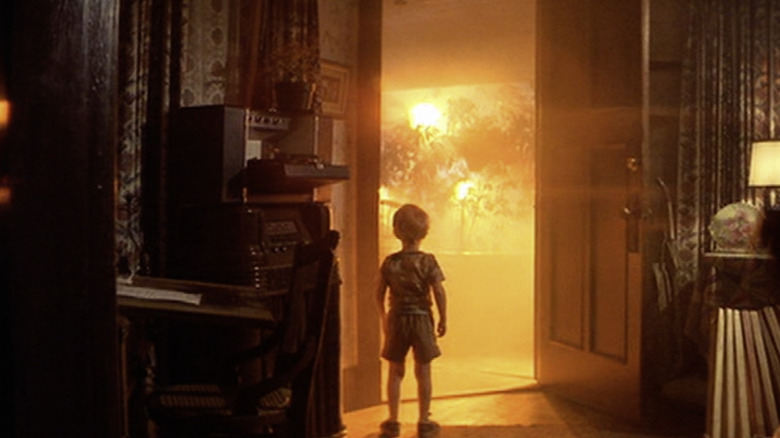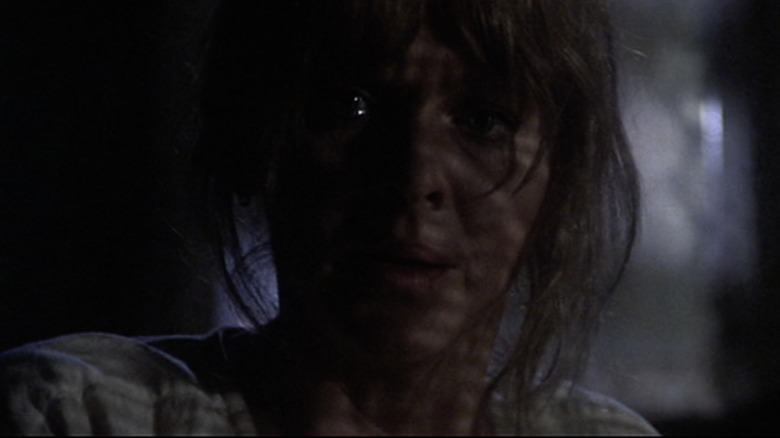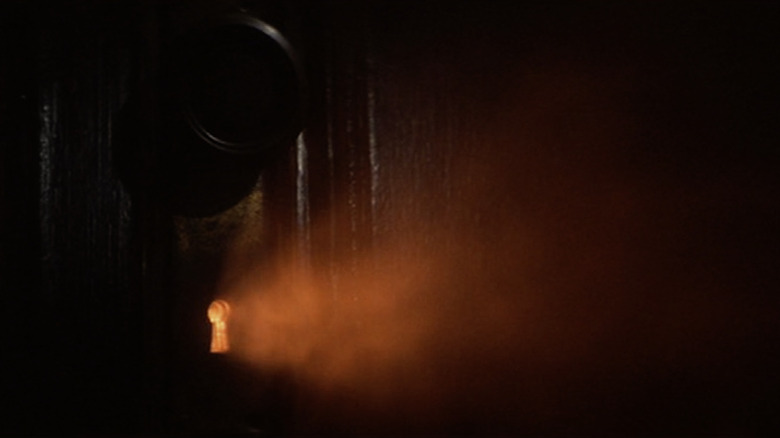Melinda Dillion's Fear Was Real During Close Encounters Of The Third Kind's Kitchen Scene
Before "E.T. The Extra-Terrestrial" captured the hearts of American audiences, Steven Spielberg's longtime fascination with aliens in outer space blossomed with his 1977 sci-fi epic, "Close Encounters of the Third Kind." Following a group of different characters, one of the film's most resonant and personal threads is Roy Neary (Richard Dreyfuss), an Indiana neighborhood electrician on a cross-country quest to learn the truth about UFOs after a close encounter of his own.
As Roy's fascination starts to grow into an unhealthy obsession, his family life at home turns upside down. He spends all of his time creating models of his metaphysical experience, and starts to neglect his responsibilities as a father. His absence at home leads to one of the most identifiable scenes in Spielberg's entire filmography — referenced earlier this year in Jordan Peele's "Nope," the abduction of Roy's son, Barry (Cary Guffey) from the perspective of his mother, Jillian (Melissa Dillon).
Colorful and chaotic, beams of light bleed through windows and doors. Technology throughout the house malfunctions. It's a scene that's simultaneously terrifying and full of wonder.
Thanks to Spielberg, Melissa Dillon's fear was real. According to "Close Encounters of the Third Kind: The Ultimate Visual History" behind-the-scenes book, Spielberg gave Cary Guffey and Melissa Dillon two different instructions in order to accomplish his vision for the famous kitchen scene.
The collpasing set was kept a secret from Melinda Dillon
If there's one thing about Spielberg, it's that he's always had a knack for directing child actors. Knowing that he wanted to portray Barry as fascinated with his surroundings in the scene rather than scared, Spielberg decided to break things down for his young star at his level. Guffey, just four years old at the time, was given a full tour of the set and how it was designed to destroy itself in the scene. "I remember him showing me the controls for how the kitchen would blow apart," Guffey said. "And he did it intentionally because he didn't want me to be scared when everything went crazy."
Spielberg also instructed Guffey to keep the mechanics of the set a secret from Dillon. He knew he wanted to provoke two different reactions from his actors, and to instruct a child naturally, he needed to frame his instruction as something playful. "That's the genius of Spielberg," he continues. "Rather than saying, 'Oh he's a four-year-old kid, he's not going to understand anything. Why bother?,' he actually took the time to show me how it was going to work, and explained to me, 'We have control of it.' To me, it was like a big joke on Melinda Dillon."
When Dillon finally arrived on set, Spielberg knew he wanted her authentic reaction to the special effects they'd built, so he instructed Dillon and Guffey that this scene would not be rehearsed before shooting. "I made sure I had two cameras on her, so I wouldn't miss it," Spielberg says. "And she didn't disappoint me!"
Spielberg is in touch with his inner child
Despite being thrown into a set with lots of harsh, moving physical elements, Dillon nailed it. When she looks back on the scene, she agrees that Spielberg made the right choice. "It worked," Dillon said. "It was terrifying. It was just frightening to have this thing fall apart around you, and it was very noisy and loud."
Though Dillon makes it look easy, one specific blocking instruction gave her some difficulty. Barry eventually would need to crawl out of Jillian's arms and into the doggy door to be abducted. Playing the scene as a cautious mother and allowing an opportunity for that to happen didn't immediately feel natural. "So my job was to justify somehow opening my arms up, and him being able to get out [of my embrace]. So that was very tricky, within my own head, to be able to get so distracted by the house falling down, to let my son out of my arms for a second."
For young Guffey, Spielberg always made sure it was a fun environment. Just behind the doggy door was Guffey's actual mother to keep him company. "To me, there was nothing to it. I just crawled through a doggy door, and there's my real mom waiting to pull me through. It was a game, and not in the least bit scary. To simplify it, the set was like playtime for me."
This is classic Spielberg; purposeful and innovative, but always in touch with his inner child.


